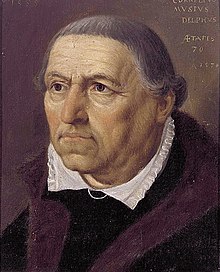Cornelis Musius

Cornelis Musius (Delft, 10 giugno 1500 – Leida, 10 dicembre 1572) è stato un presbitero e poeta olandese.
Fu l'ultimo rettore del Sint Agathaklooster a Delft, fino a quando fu impiccato senza processo nel dicembre del 1572. Anche se mai ufficialmente canonizzato, viene considerato un martire dai cattolici olandesi.
Vita[modifica | modifica wikitesto]
Musius nacque a Delft il 10 giugno 1500 (le fonti non sono tuttavia concordi su questo punto, e sono state proposte date o luoghi alternativi). Era figlio di Johannes Pietersz Muys, membro della famiglia aristocratica dei Muys van Holy di Dordrecht e di Elisabeth Woudana. Rimasto orfano da giovane, intraprese la carriera sacerdotale. Studiò teologia all'Università di Lovanio e viaggiò nelle Fiandre e in Francia, risiedendo per qualche tempo a Gand, Arras, Parigi e Poitiers. In seguito divenne rettore del Sint Agathaklooster a Delft, incarico che conservò per 35 anni. Umanista erasmiano[1], fu celebrato autore di versi latini e intrattenne rapporti epistolari con i numerosi studiosi che aveva incontrato durante i suoi viaggi.[2] Fu amico intimo di Maarten van Heemskerck, al quale commissionò un ciclo di dipinti per il convento.[3]
Dopo la presa di Delft da parte dei ribelli protestanti nel 1572, Musius, essendo un intellettuale molto rispettato, conservò il posto. Contravvenendo al coprifuoco imposto ai membri del clero cattolico e degli ordini religiosi, lasciò la città per portare in salvo i tesori della chiesa, ma fu catturato dal signore di Lumey e trasportato a Leida. Lì, nonostante avesse un lasciapassare di Guglielmo d'Orange, fu picchiato, torturato e impiccato.
Le sue sofferenze furono descritte nel Theatrum crudelitatum di Richard Verstegen (Anversa, 1587) e nel decimo libro della Historia martyrum Batavicorum di Petrus Opmeer (Colonia, 1625).
Opere[modifica | modifica wikitesto]
- Cornelis Musius, Institutio foeminae christianae ex ultimo capite Proverbiorum Salomonis, Pictavii, ex officina Marnesiorum fratrum, 1536.
- Cornelis Musius, Solitudo sive Vita Solitaria laudata, Anversa, Christophe Plantin, 1566.
Note[modifica | modifica wikitesto]
- ^ (EN) Karl A.E. Enenkel, Monastic Solitude as Spiritual Remedy and Firewall against Reformation: Cornelius Musius’s Reappraisal of the Vita Solitaria (1566), in Karl A.E. Enenkel e Christine Göttler (a cura di), Solitudo: Spaces and Places of Solitude in Late Medieval and Early Modern Cultures, Brill, 2018, p. 88, ISBN 9789004367432.«Musius was attached to humanism in many ways. From his youth onward, especially during his education at the humanist Collegium trilingue in Louvain (1517), he greatly admired Erasmus. After Erasmus’s death Musius composed poems of mourning. In these poems he hails Erasmus as the greatest scholar of his time, and he praises his ‘noble mind’, ‘illustrious virtue’, and worldwide fame, as well as the fact that he authored ‘a thousand volumes’ and mastered a kind of ‘divine art’ of writing. Although in the Tumuli there are no traces of an “Erasmian” humanism in a more narrow sense (as can be found in the works of, for example, Beatus Rhenanus, Eobanus Hessus, Theodor Bibliander, and Hadrianus Iunius), Erasmus was of paramount importance for Musius’s development as a writer.»
- ^ A. J. van der Aa, Biografisch Woordenboek der Nederlanden 12/2 (Haarlem, 1869), 1176-1180.
- ^ Ilja M. Veldman, "Maarten van Heemskerck and Hadrianus Junius: The Relationship between a Painter and a Humanist", Simiolus: Netherlands Quarterly for the History of Art 7:1 (1974), pp. 35-54
Bibliografia[modifica | modifica wikitesto]
- A.J. van der Aa: Biographisch woordenboek der Nederlanden. Deel 12. Tweede stuk. J. J. van Brederode, Haarlem 1869; S. 1176–1180.
- A. van Dijk: Cornelius Musius : een Delftse martelaar van 1572. Het Spectrum, Utrecht 1947.
- Engelbertus van Delft: Meester Cornelis Muys: de laatste pater van het St. Agatha-convent te Delft. Geert Groote Genootschap, 's-Hertogenbosch 1961.
- P. Noordeloos: Cornelis Musius (Mr Cornelius Muys) : Pater van Sint Agatha te Delft : humanist, priester, martelaar. Het Spectrum, Utrecht 1965.
- (DE) Karl A.E. Enenkel, Ein Delfter Priester als Imitator italienischer Humanisten: Cornelius Musius, Lombardo della Seta und Francesco Petrarca, in Nederlands archief voor kerkgeschiedenis / Dutch Review of Church History, vol. 72, n. 1, 1992, pp. 13-36, JSTOR 24009266.
Altri progetti[modifica | modifica wikitesto]
 Wikimedia Commons contiene immagini o altri file su Cornelis Musius
Wikimedia Commons contiene immagini o altri file su Cornelis Musius
| Controllo di autorità | VIAF (EN) 89016760 · ISNI (EN) 0000 0001 1577 2589 · SBN BVEV031917 · BAV 495/185835 · CERL cnp00448161 · GND (DE) 122073290 · WorldCat Identities (EN) viaf-89016760 |
|---|


 French
French Deutsch
Deutsch